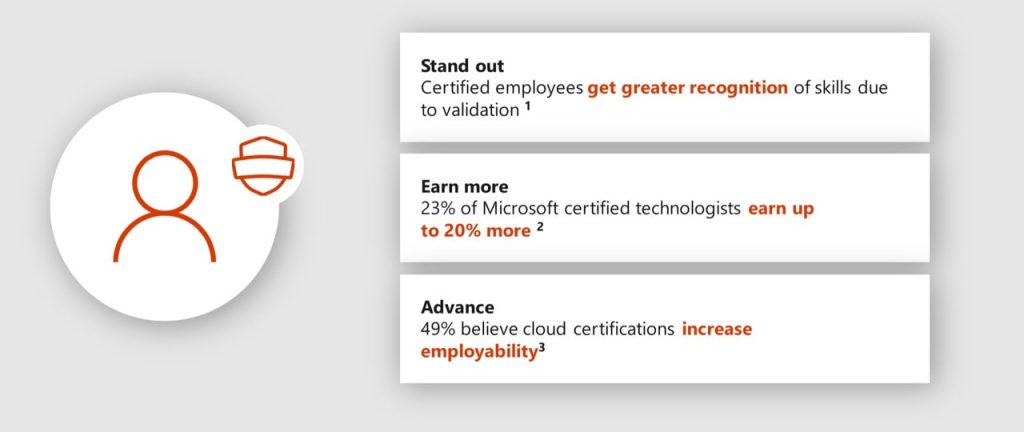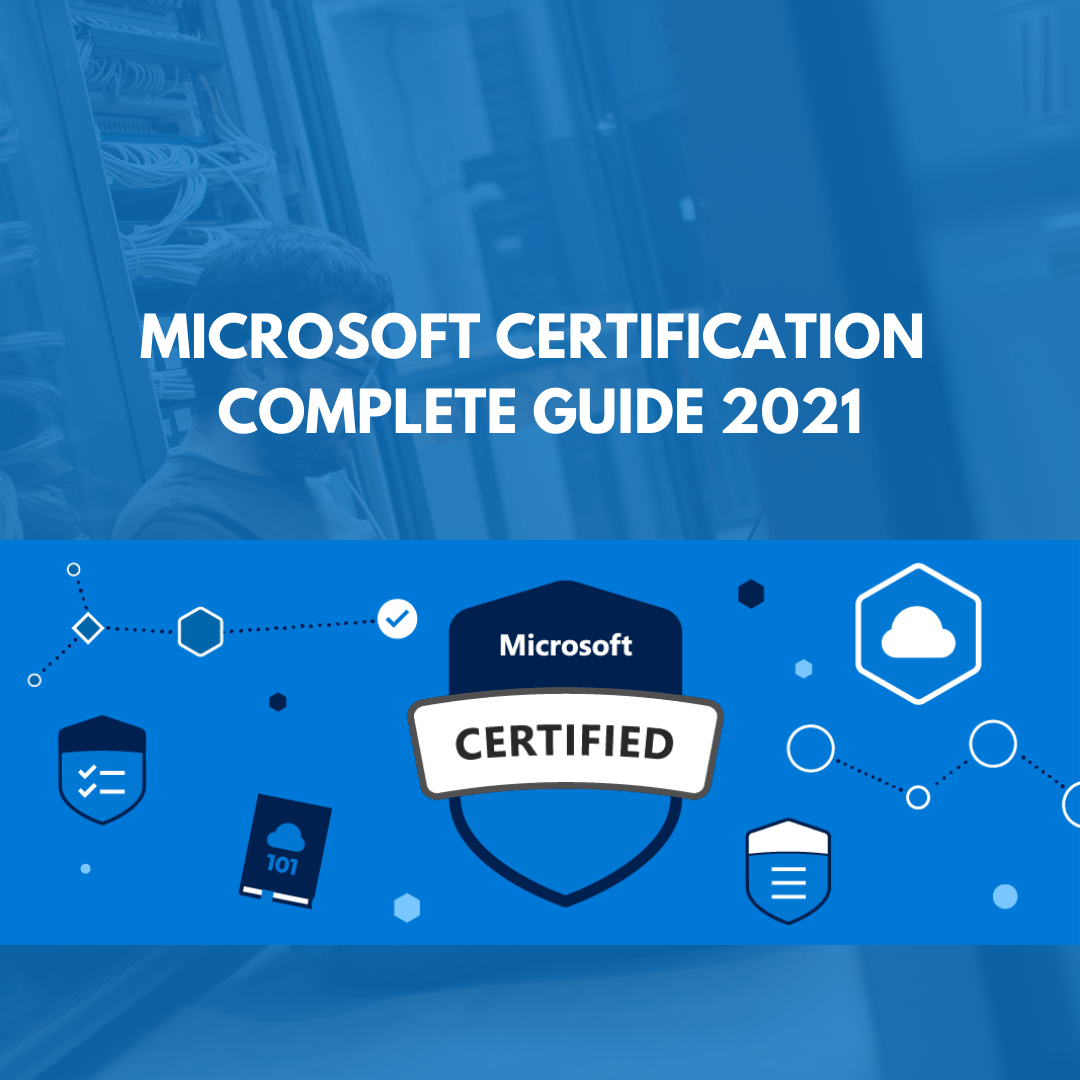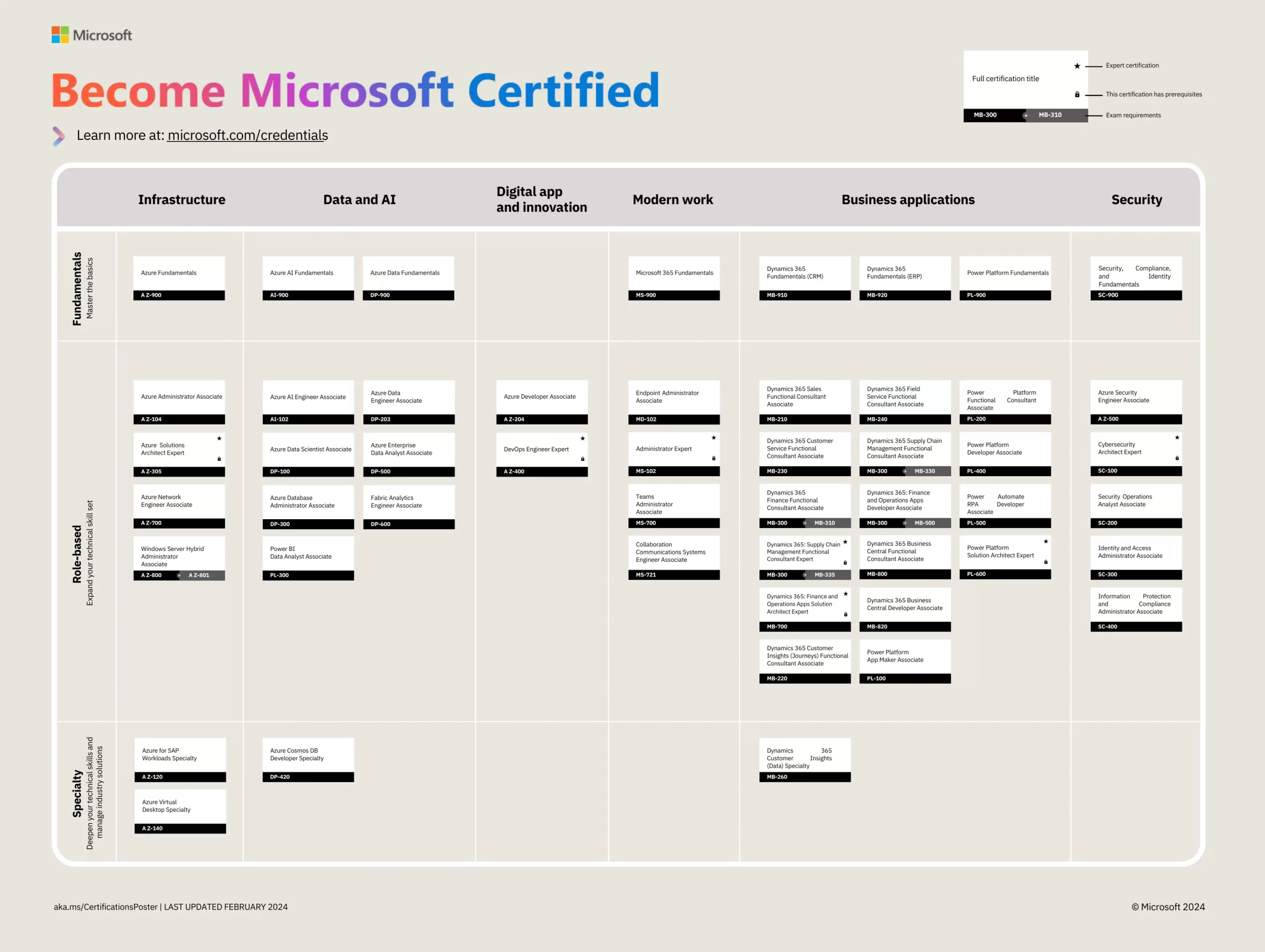One of the best ways to boost your IT career is to get a Microsoft Certification. Whether you work (or want to work) as an IT professional, analyst, developer, system, or database administrator, a Microsoft Certification can help you prove your skills and increase your chances of getting hired or promoted.
Microsoft offers many certifications, and we know from experience that some students still struggle to decide which certification path to follow. We created this guide to help you understand how to get Microsoft certified by pursuing the certifications best suited for your career and job role.
What is A Microsoft Certification?
A Microsoft Certification is awarded to IT professionals who successfully pass one or more Microsoft certification exams. When you pass one exam, you become a Microsoft Certified Professional. However, you must pass multiple exams to achieve other certifications, such as Microsoft Associate and Expert.
What Are The Benefits of Microsoft Certification?
A Microsoft certification is a great way to demonstrate your expertise, prove your skills, and boost your IT career. Studies have shown that Microsoft-certified professionals receive greater recognition of skills due to validation, earn 20% more salary, and have 49% more chances of getting employed in the IT industry.

Microsoft Certification Benefits
Types of Microsoft Certifications
Microsoft certifications are grouped into three levels:
- Fundamental Certifications – ideal for beginners to Microsoft certifications.
- Role-Based Certifications – Intermediate certifications. Build the skills needed to support a particular job role.
- Specialty Certifications – Advanced certifications. Expand your technical skills and manage industry solutions.
Microsoft Certifications Roadmap 2024
Microsoft groups certifications into six major categories (Infrastructure, Data and AI, Digital app and Innovation, Modern Work, Business applications, and Security). Each category has Fundamental, Role-Based, and Specialty certifications.
This is what the certifications roadmap for 2024 looks like (click on the image to enlarge).
Infrastructure Certifications
Microsoft Infrastructure certifications validate technical expertise in managing and implementing Microsoft’s cloud and hybrid solutions, specifically using Azure and Windows Server technologies. These certifications are structured into three categories: Fundamentals, Role-Based, and Specialty.
Fundamentals
- Azure Fundamentals (AZ-900): This certification is designed for individuals new to cloud services or Azure. It covers basic cloud concepts, Azure services, Azure workloads, and security and privacy in Azure.
Role-Based
- Azure Administrator Associate (AZ-104): Focuses on managing, implementing, and monitoring an organization’s Azure environment.
- Azure Solutions Architect Expert (AZ-305): Intended for IT professionals who translate business requirements into secure, scalable, and reliable solutions on Azure.
- Azure Network Engineer Associate (AZ-700): This certification targets professionals interested in designing, implementing, and maintaining Azure networking solutions.
- Windows Server Hybrid Administrator Associate (AZ-800, AZ-801): Geared towards those managing Windows Server hybrid and local infrastructures incorporating cloud technologies.
Specialty
- Azure Virtual Desktop Specialty (AZ-140): This specialty is designed for IT professionals who deliver virtual desktop experiences and remote apps for any device on Azure.
Data and AI Certifications
Data and AI certifications validate and enhance data analysis, machine learning, AI application development, and data management skills on Microsoft Azure. These certifications are designed for various roles, including data scientists, AI engineers, and database administrators.
Fundamentals:
- Azure AI Fundamentals (AI-900): This certification is intended for individuals looking to demonstrate knowledge of common machine learning and artificial intelligence workloads and how to implement them on Azure.
- Azure Data Fundamentals (DP-900): Designed for beginners in data science and data engineering, this certification covers core data concepts and works with relational and non-relational data on Azure.
Role-Based:
- Azure AI Engineer Associate (AI-102): Targets professionals responsible for building, managing, and deploying AI solutions that leverage Azure Cognitive Services, Machine Learning, and Knowledge Engineering.
- Azure Data Engineer Associate (DP-203): Focuses on individuals who design and implement the management, monitoring, security, and privacy of data using the full stack of Azure data services.
- Azure Data Scientist Associate (DP-100): Designed for data scientists who apply machine learning techniques to train, evaluate, and deploy models that solve business problems.
- Azure Database Administrator Associate (DP-300): Aimed at database professionals who manage cloud and locally hosted relational databases built on top of Microsoft SQL Server and Azure data services.
Specialty:
- Azure Cosmos DB Developer Specialty (DP-420): This specialty certification is for developers who build cloud applications and services that leverage Azure Cosmos DB, Microsoft’s globally distributed, multi-model database service.
Digital App and Innovation Certifications
Microsoft’s Digital App and Innovation Certifications help students build the skills of professionals involved in application development, deployment, and management, particularly focusing on leveraging Microsoft technologies to create innovative solutions.
Fundamentals:
- Azure Developer Associate (AZ-204): This certification is designed for developers who participate in all phases of development, from solution design and development to testing and maintenance, with Microsoft Azure technologies.
Modern Work Certifications
Microsoft’s Modern Work Certifications validate the skills and knowledge necessary to deploy, manage, and optimize Microsoft 365 services. These certifications are designed to demonstrate proficiency in Microsoft’s suite of productivity and collaboration tools, essential for supporting modern work environments emphasizing communication, collaboration, security, and compliance.
Fundamentals:
- Microsoft 365 Fundamentals (MS-900): This certification covers the foundational knowledge of Microsoft 365 services and concepts, including cloud basics, Microsoft 365 pricing and support, and the fundamentals of Microsoft security, compliance, and trust.
Role-Based:
- Teams Administrator Associate (MS-700): Aimed at professionals who configure, deploy, and manage Office 365 workloads for Microsoft Teams, focusing on efficient and effective collaboration and communication in an enterprise environment.
- Endpoint Administrator Associate (MD-102): This certification focuses on managing and deploying Windows and other devices in a corporate environment, including device compliance and security.
- Administrator Expert (MS-102): Designed for IT professionals who deploy, configure, secure, manage, and monitor devices and client applications in an enterprise environment.
- Power Platform Developer Associate (PL-400): Targeted at developers who design, develop, secure, and troubleshoot Power Platform solutions.
- Power Platform Functional Consultant Associate (PL-200): Designed for consultants who leverage Power Platform to build apps and solutions that use Microsoft Dynamics 365, Microsoft 365, and Azure capabilities.
- Power Platform Solution Architect Expert (PL-600): Aimed at solution architects who lead successful implementations and focus on how solutions address organizations’ broader business and technical needs.
Security Certifications
Microsoft’s Security Certifications equip IT professionals with the skills to implement and manage security measures across Microsoft technologies and platforms. These certifications focus on various topics, including securing identity and access management, protecting data, applications, and networks, and managing compliance and security standards.
Fundamentals:
- Security, Compliance, and Identity Fundamentals (SC-900): This certification is designed for individuals looking to familiarize themselves with the fundamentals of security, compliance, and identity (SCI) across cloud-based and related Microsoft services. It is an entry-level certification covering security, compliance, identity concepts, methodologies, and services provided on Microsoft platforms.
Role-Based:
- Azure Security Engineer Associate (AZ-500): This certification is for individuals who implement security controls and threat protection, manage identity and access, and protect data, applications, and networks in cloud and hybrid environments as part of an end-to-end infrastructure.
- Cybersecurity Architect Expert (SC-100): Aimed at security professionals who design and manage an organization’s security architecture.
- Security Operations Analyst Associate (SC-200): This certification is intended for analysts who investigate, respond to, and hunt for threats using Microsoft Azure Sentinel, Azure Defender, and Microsoft 365 Defender.
- Identity and Access Administrator Associate (SC-300): Targets individuals who design and implement an organization’s identity and access management systems by using Azure AD.
- Information Protection and Compliance Administrator Associate (SC-400): Designed for administrators implementing and managing data protection, data loss prevention, information governance, and information rights management policies.
Microsoft Certifications By Platform
Another way to find the best Microsoft certification for your career is to look at the most popular certifications by platform. The courses and certifications high in demand are related to Azure, Microsoft 365, and Power Platform.
Microsoft Azure Certifications
Azure is a cloud platform hosting products and services designed to build enterprise application cloud solutions. It’s by far the most widely used platform for creating and managing applications in the cloud.
Becoming Azure certified is a great way to advance your IT career. With the rise of cloud-enabled solutions, Azure-certified professionals are in high demand, and Azure certifications are the most popular Microsoft certifications to pursue in 2024.
Top Azure Certifications
- Azure Solutions Architect Expert (AZ-305): This certification is aimed at individuals who have advanced experience and knowledge of IT operations, including networking, virtualization, identity, security, business continuity, disaster recovery, data platform, budgeting, and governance. To pass the exam, should have expert-level skills in Azure administration and have experience with Azure development and DevOps processes.
- Azure Administrator Associate (AZ-104): The Azure Administrator Associate certification is designed for those who implement, manage, and monitor an organization’s Microsoft Azure environment, including virtual networks, storage, security, and governance.
- Azure DevOps Engineer Expert (AZ-400): Azure DevOps engineers streamline delivery by optimizing practices, improving communications and collaboration, and creating automation. This certification focuses on a fundamental and advanced understanding of DevOps practices using Azure technologies.
Microsoft 365 Certifications
Microsoft 365 (previously Office 365) is a platform that enables people and businesses to develop and deploy Office applications and intelligent cloud services.
The path to becoming Microsoft 365 certified is not as complicated as Azure’s. You must start with the fundamentals and then choose a role-based certification.
Top Microsoft 365 Certifications:
- Microsoft 365 Certified: Enterprise Administrator Expert: This certification is designed for individuals who evaluate, plan, migrate, deploy, and manage Microsoft 365 services. It requires a deep understanding of Microsoft 365 workloads and usually requires candidates to have completed one of the Microsoft 365 workload administrator certifications prior to attempting it. It’s one of the most comprehensive certifications for those managing Microsoft 365 services and features, proving advanced skills.
- Microsoft 365 Certified: Teams Administrator Associate: With the rising importance of remote work and collaborative technologies, the Teams Administrator Associate certification covers everything from setting up and managing Teams settings to securing communication in Teams.
Microsoft Power Platform Certifications
The Microsoft Power Platform allows you to connect different technologies, such as Office 365, Dynamics 365, and Azure, to build powerful end-to-end business solutions.
Beginners can start with the Power Platform Fundamentals certification and then pursue an associate or expert certification. The most popular certifications for Power Platform are:
Top Microsoft Power Platform Certifications:
- Microsoft Certified: Power Platform Solution Architect Expert (PL-600): This certification is for professionals with a broad knowledge of Power Platform, functional areas of Microsoft Dynamics 365, and associated technologies.
- Microsoft Certified: Power Platform Developer Associate (PL-400): Aimed at developers who create and implement solutions that utilize Power Platform services. This certification validates the skills to design, develop, secure, and troubleshoot solutions.
Microsoft Role-Based Certifications
Microsoft role-based certifications are designed to align closely with specific career roles, particularly within the Microsoft ecosystem. These certifications help professionals validate their skills and knowledge for specific job functions related to Microsoft technologies and platforms, such as Azure, Microsoft 365, Dynamics 365, and Power Platform.
Each certification is tailored to a particular role in the IT and development sectors, such as administrator, developer, solutions architect, data engineer, AI engineer, and security engineer.
The certifications cover all necessary aspects of a role, including how to implement, manage, and monitor an IT environment.
Role-based certifications come in three levels( Fundamental, Associate, and Expert). Fundamental certifications provide a starting point for beginners, Associate certifications are meant for those with moderate experience, and Expert certifications are designed for highly experienced professionals who require advanced skills in their roles.
Examples of Microsoft role-based certifications include:
Developer Certifications
- Microsoft Certified: Azure Developer Associate
- Microsoft Certified: Power Platform Developer Associate
Administrator Certifications
AI Engineer
Solution Architect Certifications
- Microsoft Certified: Azure Solutions Architect Expert
- Microsoft Certified: Cybersecurity Architect Expert
Data Engineer Certifications
How To Get A Microsoft Certification
1. Identify your certifications
Choose the certification(s) that aligns with your career goals and skill level. Begin by assessing where you are in your professional journey and where you want to go.
For example, if you start with Azure, the Microsoft Certified: Azure Fundamentals certification is a great first step. This will help you understand the basics of cloud services and how they operate on Microsoft Azure.
Once you grasp the fundamentals, you can progress to more advanced certifications, like the Microsoft Certified: Azure Administrator Associate or Microsoft Certified: Azure Solutions Architect Expert, depending on your career objectives and interests.
2. Prepare for the exams
We all learn differently, and Microsoft offers multiple exam preparation methods. You can choose from accelerated Bootcamp training, instructor-led (classroom live), virtual classroom live, and online courses.
Accelerated Bootcamp Training
This is the fastest and most reliable way to get Microsoft Certified. Accelerated Bootcamp training (sometimes called “Microsoft Boot camps“) allows students to learn technologies in a fraction of the time of traditional classroom training.
Certification Camps exclusively deliver specialized training using the Microsoft Boot Camp format. Our training model blends knowledge and certification prep into one solution. This “hybrid” solution is designed for you to learn the exam’s objectives, not just “learn the exam.” We offer “All-Inclusive” pricing with airfare, lodging, transportation, meals, books, and test vouchers.
Instructor-Led Training
Interact face-to-face with Microsoft-certified trainers. You can learn from the experts for those looking to develop their skills and technical expertise. You can choose from two different options with Instructor-Led Training:
- Classroom live (in-class training)
- Virtual Classroom Live (Remotely attend and interact with the instructor led-live class)
3. Take the exams
You can take Microsoft certification exams online or at an authorized testing center. The average cost of a Microsoft exam is US$165, which can vary depending on the subject.
If you choose Bootcamp training, you can take the exam after completing your training without extra cost.
4. Renew your certifications
There is a lot of confusion about Microsoft certifications and how to renew them to stay updated with new changes. What you need to know is the following:
- Microsoft fundamentals certifications do not expire.
- Role-based certifications expire after one year.
- Renewals are free. There is no cost to renew your certification.
- You have six months to renew a certification (from the date it expires).
- You can take the renewal assessment via Microsoft Learn. Once you pass, your certification will be extended for one year from expiration.
- Renewal assessments are short, unmonitored, and open-book. They focus on recent changes made to the technology.
- You can retake the renewal exam as many times as you want.
Microsoft Certifications FAQ
Which Microsoft Certification is Best For Beginners?
The Microsoft Fundamentals Certifications are suitable for individuals just starting in technology or thinking about a career change. Microsoft offers fundamental certifications for Azure, Microsoft 365, and Dynamics 365.
Which is The Most Popular Microsoft Certification?
According to Microsoft, the most popular certifications are MCA Azure Administrator, MCE Azure Solutions Architect, MCE Microsoft 365 Enterprise Administrator, and MCE Azure DevOps Engineer.
Can Microsoft Certifications Get You a Job?
Yes, obtaining Microsoft certifications can significantly enhance your job prospects. Certifications demonstrate to potential employers that you have specific technical skills and a commitment to professional growth, which are highly valued in the tech industry.
Employers often look for certifications to indicate a candidate’s ability to work with Microsoft technologies.
Additionally, Microsoft certifications can help you stand out in competitive job markets and even negotiate higher salaries, as they are a testament to your skills and dedication to keeping up with technological advancements.
A recent study by Pearson Vue showed that people who got a Microsoft Certification:
- 37% received a salary increase.
- 27% accepted job promotions.
- 92% said they are more confident in their abilities.
- 81% said they have more confidence to explore new job opportunities.
- 53% of employers covered the training costs for exam preparation.
About Certification Camps
Certification Camps is a proud Microsoft Gold Partner and a Microsoft Solutions Provider (recommended by Microsoft). It operates in 36 different training centers across the US. Our Corporate Offices are located in beautiful Sarasota, FL. We have a team of 15 dedicated instructors who consult and teach. Many of our instructors are authors, Microsoft MVPs, and MCMs—all consultants in the field.


